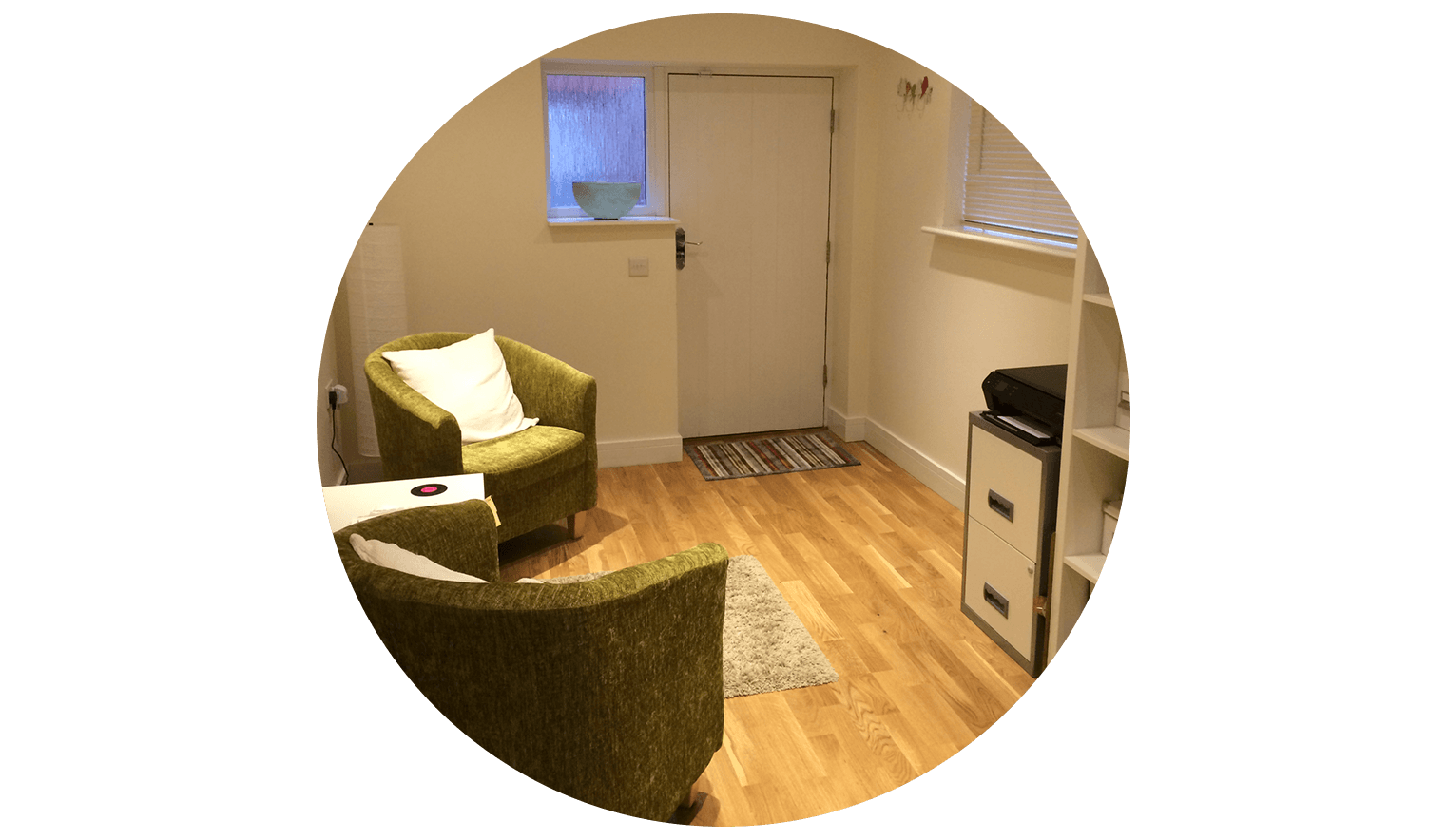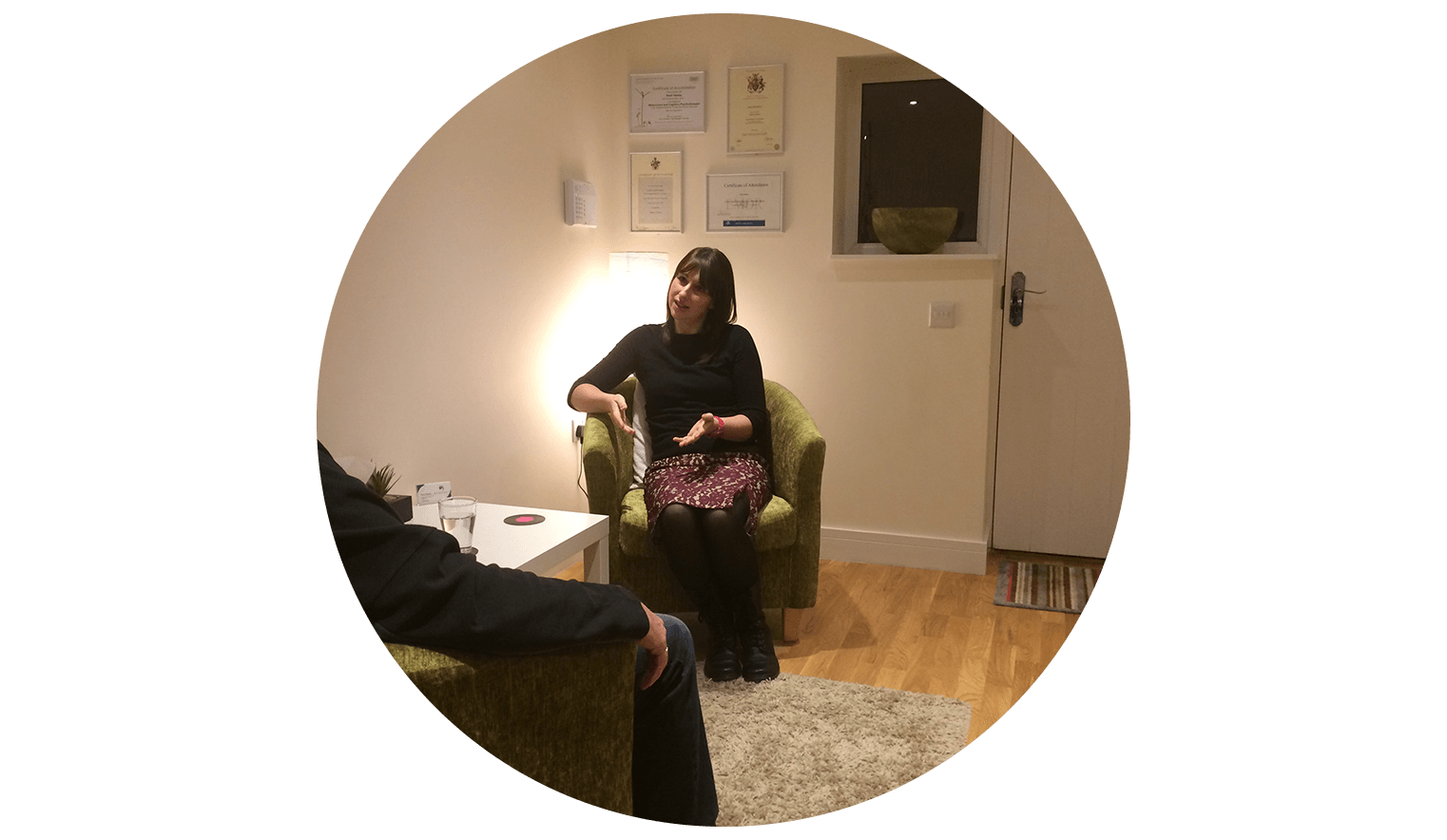My Head Space offers a calm and peaceful environment for individual therapy for people aged 13yrs and over, with a wide range of common mental health problems currently interfering with everyday functioning. This can be through face to face contacts or for those who may find it difficult to leave the house or travel, I also provide Skype or telephone treatments. Home visits can be negotiated on an individual basis.
We are also able to offer Clinical Supervision for PWP’s, Trainee CBT Therapists and qualified CBT Therapists.
We also work in affiliation with businesses such as Insurance companies, Private Health Care Providers, Solicitors, Private Employers and other Intermediaries, offering both CBT and EMDR on a contractual basis. These referrals can be made through my accredited professional body (BABCP) or directly to My Head Space at [email protected]. Fees for corporate referral available on request.


PG.Dip Cognitive Behavioural Psychotherapy, Dip Nursing (Mental Health), Cert. EMDR, BABCP Accredited.
I am a Cognitive Behavioural Psychotherapist and EMDR Therapist and Clinical Supervisor with over 25 years clinical experience of working with mental health problems, both the NHS and in my own Private Practice since 2013. My professional background is Mental Health Nursing and I have been practicing CBT since 2008. I am an accredited practitioner with the BABCP (British Association of Behavioural and Cognitive Psychotherapies) and this requires me to maintain high professional standards and remain updated on the current evidence for best practice.
I am a Cognitive Behavioural Psychotherapist, fully accredited by the British Association of Behavioural and Cognitive Psychotherapies and working predominantly in the NHS. I am also a trained therapist in delivering Eye Movement Desensitisation and Reprocessing (EMDR).
I have been working in the field of psychological therapies since 2006 and completed my CBT training in 2009. l have since gained extensive experience working with depression and anxiety related issues including Social Anxiety, Obsessive Compulsive Disorder (OCD), Health Anxiety, Eating Disorders, Phobias and Post Traumatic Stress Disorder (PTSD). l am always keen to expand my knowledge and learning, and over the last year have done some additional training in adapting CBT treatment for people with significant, long term medical conditions.
I seek to create a relaxed therapeutic environment, and believe in working collaboratively with you to develop a treatment plan suited to your individual needs.


BSc Hons Occupational Therapy
I am a registered Occupational Therapist. I have previously worked within the NHS as an Occupational Therapist and latterly a Senior Employment Advisor. I have over 10 years experience working in Acute inpatient unit settings and in the community, with people with Severe and Enduring Mental Health conditions, including people who are experiencing their first episode of psychosis.
I am an experienced manager of other Practitioners and has offered Clinical and Managerial Supervision as part of my previous roles. I enjoy giving supervision to others, enabling them to develop and move forward in their own skills and experiences.
I'm able to offer interventions for Anxiety management, Low Self-confidence and am the Lead for our Employment Advisor Service.

Hazel is a fantastic Supervisor. She is exactly what I need and makes me feel safe to talk about anything, whilst giving me really good advice and guidance on cases. I feel completely supported by her and know that she doesn’t judge me if I’m finding a case challenging or am struggling with something. I’d recommend her to anyone as a Supervisor and Therapist. Not only is she warm, kind and open, but she knows her stuff and I have learnt a lot from her.
Working with Beth through the employment advisor service helped me engage with my employer positively despite my anxiety about doing so. She took time to get to know me and her knowledge of employment process and regulations helped me to find my voice within a situation which was very overwhelming. Beth was there as a support throughout the process to a positive outcome for me. She is friendly, approachable and kind. I can’t speak highly enough of the service and support, working with Beth helped me to feel listened to and find positives within a process which is alien to most people, without Beth I wouldn’t have known about any of the regulations which helped with the outcome.
I have no hesitation in recommending Hazel for the consistently high quality of her Cognitive and Behavioural Psychotherapy knowledge, skills and experience. She approaches her psychotherapy work with a high degree of professionalism, empathy and compassion and this, combined with her psychotherapy skills, is a powerful combination.
Hazel was recommended to me by a friend and having CBT with her transformed the way I viewed myself. It improved every aspect of my life and I’m so happy I did it.
Cognitive Behavioural Therapy (CBT) is the most evidence based treatment choice for common mental health problems, as recommended by NICE guidelines (http://www.nice.org.uk) National Institute for Health and Care Excellence. CBT focuses treatment on difficulties in the here and now, but past experiences are also explored in an attempt to understand how they may have contributed to the current situation and maintenance of the mental health difficulties. The often cyclic nature of these issues is identified and explored, looking at cognitive and behavioural patterns, which are adopted as a coping mechanism. CBT allows individuals to ‘break the cycle’, allowing positive changes to occur in the way we perceive, experience and respond to the challenges which we face.
Through Cognitive therapy It is possible to identify and positively refocus beliefs we may hold about ourselves, the people around us and the world in which we live. It also incorporates the identification of certain patterns of thought which may occur, such as negative predictions and assumptions, rumination and over-analysing. It is possible through CBT to gain better control over our thoughts, which can have a significant impact on improving and maintaining better mental health.
Behavioural therapy focuses on our responses to these thoughts, emotions and difficult situations. These often manifest themselves as avoidances, seeking reassurance or as actions we believe will keep ourselves safe and secure whilst facing trials. People tend to repeat this pattern as a coping strategy, but find that their circumstances do not improve, resulting in negative emotional responses. This then perpetuates the cycle. It is possible to collaboratively explore new ways of behaving, through challenging negative thoughts (cognitions) in a more productive manner, resulting in the development of new coping strategies.
Therefore through a combination of cognitive and behavioural therapy, it is possible to allow a positive ‘shift’ to take place, where we have previously felt ‘stuck’ and unable to manoeuvre away from old patterns of thinking and behaving.

Eye Movement Desensitisation and Reprocessing (EMDR) is a therapy used primarily for treating symptoms of trauma and was initially developed as a treatment for Post-Traumatic Stress Disorder (PTSD). However, over the last decade research has shown effective results in the treatment of many other disorders, such as phobias, panic, bereavement and even pain management.
It is based on the natural healing process of the mind, which occurs during REM sleep (Rapid Eye Movement). It is thought that our emotions are processed during REM sleep, and treatment holds its basis in this principle. It is believed that intentional eye movement, or tapping which results in bilateral stimulation of the brain, whilst recalling distressing, traumatic memories allows the brain to ‘process’ those memories. The brain naturally becomes ‘desensitised’ to the distressing content, leaving the memory as a neutral event from the past.
This treatment approach is not to be confused with hypnotherapy. It requires the individual to remain fully conscious and focussed on the memories in order for EMDR to be effective. It incorporates feedback to the therapist throughout treatment, again, to ensure collaborative engagement with the process.
EMDR sessions can be between 60-90 minutes. For more detailed information on EMDR go to http://emdrnetwork.org or http://getsefhelp.co.uk/emdr.htm
There are times when suffering with mental health difficulties impacts on our employment. Whether this is our ability to function in the working environment, our effectiveness within our role or being required to take time off in order to recover before returning to the workplace. All of which can compound our symptoms and increase distress, impeding our overall recovery.
We are offering a service for individuals who find themselves in a situation that they feel overwhelmed by and can offer both a supportive and advocacy role for you. It can be in conjunction with other treatments or accessed independently.
The service includes an initial consultation of the presenting circumstances and then depending on the outcome, may involve either one off advice; liaison with your Employers on your behalf; arranging and attending meetings with you; exploring appropriate changes to your environment and/or we can be the point of contact for your workplace whilst you are focussing on your recovery.
Beth's most recent experience has been in the Primary Care Mental Health setting working as a Senior Employment Advisor, supporting individuals who find themselves off work due to poor mental wellbeing (eg,Depression, Anxiety & Work related Stress). Beth is passionate about working together with clients to help improve their mental health, maintain positive working relationships with their Employers whilst unwell and ultimately retaining their position of employment.
| Assessment | £90 |
| Treatment Session - CBT | £85 per session |
| Treatment Session - EMDR (up to 90 mins) | £100 per session |
| Clinical Supervision | £85 per session |
| Home Visits | £85 per session + Travel Costs @45p per mile |
| Face to face | £55 per hour |
| Liaison / document advocacy thereafter |
£50 |
These fees are payable at each session through: cash or bank transfer.